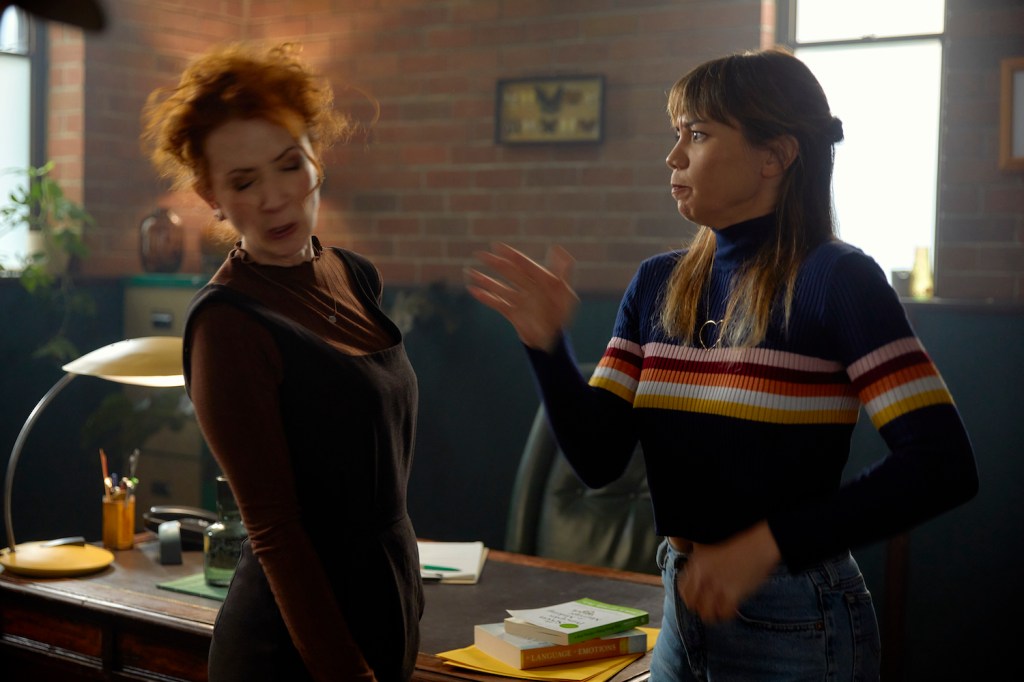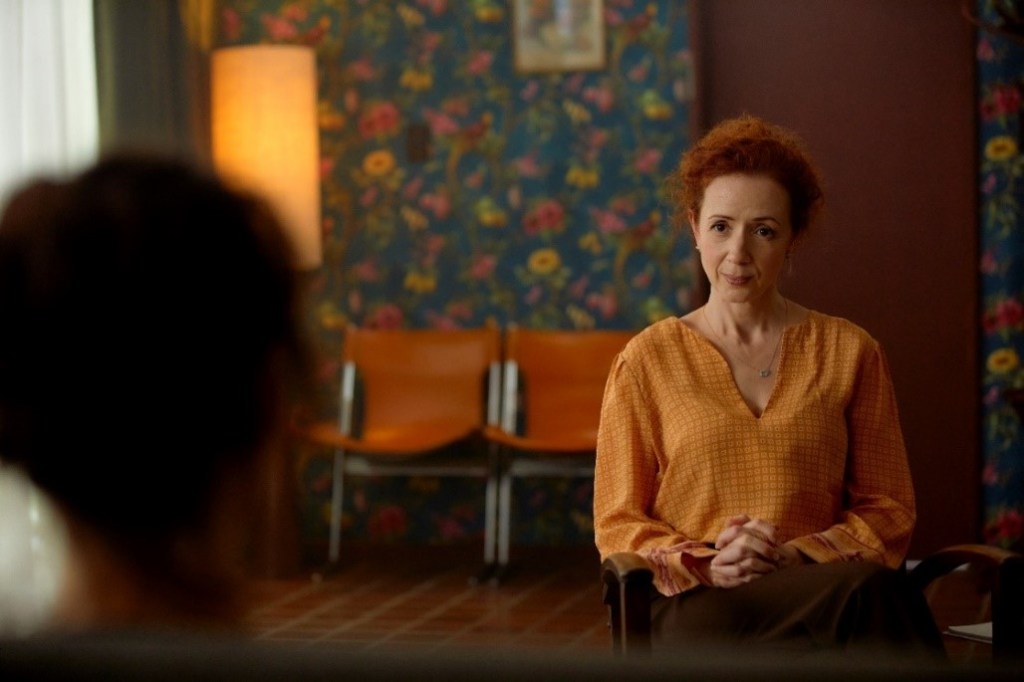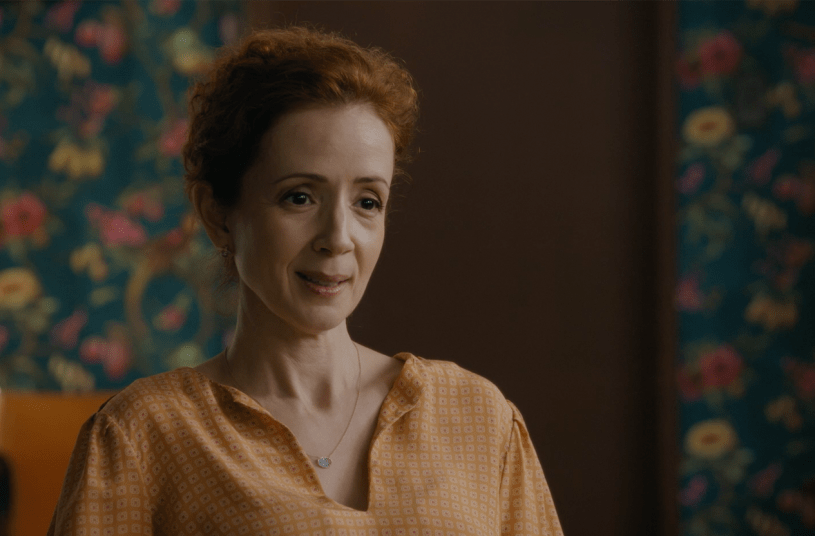When writer/director Stef Smith approached actor Ana Maria Belo about one of the episodes of It’s Fine, I’m Fine potentially being in Auslan, Belo was excited for the opportunity and determined to do it “the right way”.
Belo, who is deaf, plays the lead character in the short-form series, Joanne – a suburban Australian psychologist who helps her patients explore the mess, humour, melancholy and unexpected magic of life.
After approaching Belo directly for the role, Smith asked her to come further on board as a story producer and writer. Together they re-wrote the episode that was to now be in Auslan, and created a broader story arc for Joanne.
Belo felt it critical that a language consultant was also brought onto the production. She notes too often Deaf actors are asked to translate scripts into Auslan themselves, or productions ask family members of the actor to translate, instead of professionals.
“Auslan is so detailed and each person has their own way of expressing certain signs. You have to make sure you have a language consultant on board that’s going to legitimise the script and language that you’re using, and make sure that the signs you’re using and the context of those signs is accurate,” she tells IF.
“Auslan, it’s a nationwide language, yes. But then there’s tiny nuances and dialect differences between Sydney and Melbourne, or Sydney and Perth. My favourite example is if somebody asks you if you want cream in your coffee and you’re in Perth – that’s the same sign for ‘fuck’ in Sydney.
“It’s things like that where you need a language consultant on board who understands all of that.”

Edan Chapman, who also plays Lou, was It’s Fine, I’m Fine’s language consultant – Chapman has Usher’s Syndrome and is Deafblind. He and Belo worked together for a long time to finesse the script so that it would feel authentic and speak to the community.
As a director, Belo regards Smith as an incredible supporter, noting she completely took on board what they had to say, down to the level of shot framing. For instance, you can’t do a close up on someone’s face while they are signing, nor can you focus on their hands; for the nuance and full meaning of what someone is saying to come across, you need both the face and hands in frame.
On set, Belo notes they sat down with the crew every morning to work out what would be required so that the set was accessible and inclusive on that day.
“It was just it was so amazing to watch the crew go, ‘Ana, how do I sign this? How do I say this?’, so they could communicate with Edan. It was really beautiful. I hope I get to see more of that,” she says.
As an actress, Belo works across both stage and screen, with recent film and TV credits including Unsound, Frayed and Bump. Across her career, when she has spoken up about the need for Auslan language consultants, she’s heard variously: “What’s that?”, “We’ll do that on set”, or “We don’t have the budget for that.” She argues that introducing a consultant on set is far too late, and if producers don’t have the budget for a consultant, they shouldn’t have a Deaf character at all.
With Screen NSW sector investment manager Sofya Gollan, she is developing a tool kit for producers and casting directors around considerations when it comes to developing d/Deaf characters and working with actors.
She notes that too often there are assumptions – sometimes well-meaning but misplaced – made by production teams about what sort of supports are required.
“It’s really tiring having to advocate for yourself all the time,” she says.
“Even for a hearing person or an able-bodied person, being on set can be extremely daunting… So I think that anybody who has a disability, or something else happening for them, we need to be allowed to talk about it. I would rather somebody go, ‘Hey, what do you need? What can I help you out with?’ People don’t want to offend people, but I’d rather you talk and ask me than just assume.”

In the wake of CODA winning the Best Picture Oscar, Belo has noticed an increase of deaf characters, but notes too often they are written by a hearing person. She’d like to see a greater understanding about what deafness can look like and means for individuals.
“I would like to see more deaf writers. At the moment I feel like there’s a want and a need to see more deaf characters. And I can see that happening, where there’s more auditions coming in. But I feel like it’s still, ‘Oh, we’ve got this deaf character here who’s going to move the storyline this way or create some sort of emotional pull.’ I’m like, no, I want to see the deaf surfer, the deaf lawyer, the deaf cafe owner, or the deaf love interest. But I feel like those stories need to come from an organic place.”
For her own part, Belo is currently developing a children’s TV comedy about a deaf superhero as well as various other projects. Her past work as a writer includes short films Things to Do, which won the Women In Film Award at Tropfest in 2011, Magic Words, The Kid’s Table and web series Real Tinder Nightmares.
On screen, Belo also advocates for deaf actors to not just be boxed into having to play deaf characters; she just wrapped on Disney+’s Last Day of the Space Age playing a character who was a hearing person.
Sets, as often busy “hearing lands”, can be frustrating places, Belo says. While everyone on set knows she is deaf, it can get forgotten amid the rush of production. The addition of masks with COVID-19 has made it harder to hear what people are saying.
“I can speak, I do use speech, I sing, I am very musical, I do accents. I do all of the above. It looks easy, but it’s so taxing on my brain, my eyes and and my mental energy,” she says.
“The problem that I think a lot of deaf actors face – if they’re using a device like hearing aids or Cochlear – is the onslaught of sound and having to find the one clear line of communication… Sometimes you do have to advocate for that, and go ‘I need a clear line; I just need to be told very clearly what’s going on’.
“It’s funny, I hear other [deaf] actors go, ‘The one thing I want through a block through is for the whole crew to be silent’. I love that, but I can’t ask for that. Older actors and more established actors can ask for that. I don’t feel like I can… It’s interesting how much we’re still having to advocate for normal on set behaviour.”
However, looking to the future, Belo is positive, noting projects like Asphyxia‘s Future Girl in the pipeline.
“I’m excited where deafness and disabled people are going within the industry. Look at Heartbreak High – so exciting. And I’m excited for the next generation that are coming through. I think what’s going to happen up ahead is going to be really big for everyone.”
It’s Fine, I’m Fine, the only Australian project selected for Canneseries earlier this year, is currently screening on NITV and available to watch via SBS On Demand.


